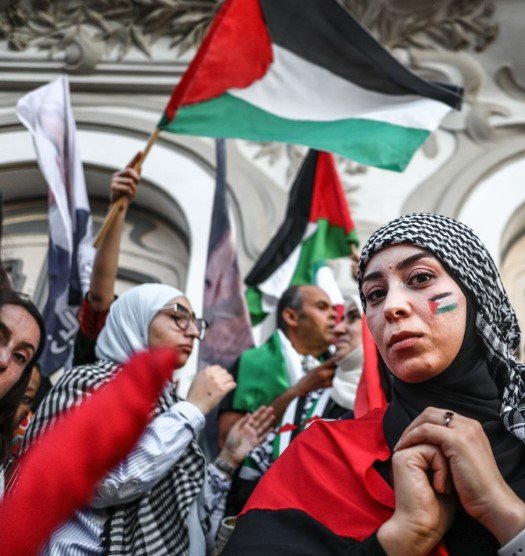Activists’ symbolic mission ends in Sirte as geopolitical walls close in
What started with hope and rosewater has ended in roadblocks and detentions. The Sumud caravan, a symbolic delegation of over a thousand North African activists making their way to the Gaza border through Libya, has officially pulled the brakes after Egyptian and eastern Libyan authorities barred its passage.
From celebration to silence in less than a week — the road from Tunisia to Rafah wasn’t long on a map, but politically, it turned into a dead-end.
Where Hope Met a Concrete Wall
The Sumud delegation wasn’t carrying trucks of aid or convoys stacked with medicine. Instead, it was made up of people — men, women, and youth from Tunisia, Libya, Algeria, and Sudan — who believed their presence alone would speak volumes.
“We never promised to break the siege physically. This was a symbolic act, a show of support. That alone felt powerful,” said one of the organizers, who spoke on condition of anonymity.
But the symbolism didn’t sit well with everyone. The group — which had swelled to nearly 1,500 participants and was traveling in a convoy of 100+ vehicles — found the mood shift dramatically as they approached the Libyan city of Sirte, the invisible line where Libya’s east meets west.
First came the whispers, then the threats. By Thursday, their movement had stopped entirely.

Who Blocked What — and Why?
Organizers blame Egypt and its influence over eastern Libyan forces.
“Haftar’s men told us directly,” another member explained. “Without approval from Egypt, you’re not going forward. Period.”
It wasn’t just informal communication. According to a Libyan official based in the east, Cairo had formally requested that the Libyan National Army (LNA) halt the caravan’s progression. One Egyptian official and a Cairo-based political researcher close to the security establishment confirmed this version to Mada Masr.
What was Egypt afraid of?
-
Embarrassment.
-
Public pressure.
-
The optics of an independent civil movement reaching the Rafah border during a time of severe humanitarian strain in Gaza.
Cairo’s silence has been deliberate. By stopping the caravan before it reached the Rafah gate, Egypt avoided having to publicly reject or accept them — a PR puzzle they clearly didn’t want to solve.
A Journey of Contrasts
The early part of the trip was euphoric.
At every stop in western Libya, locals welcomed the caravan with open arms. “It felt like a celebration, like we were doing something historic,” said a young Tunisian woman who joined the delegation from the start. “Kids were waving flags. Women were throwing flower petals. People cooked for us — they cried with us.”
And then came Sirte. A ghost town in comparison. No cheers. No welcomes. Just checkpoints, silence, and suspicion.
That night, as the sun dipped below the flat Libyan horizon, many in the caravan began to realize they might not reach Rafah after all.
Arrests, Intimidation, and Uncertainty
By the time Monday rolled around, 13 members of the caravan had been detained by authorities loyal to the LNA. Organizers wouldn’t say whether the detained were all foreign nationals or if some were Libyans themselves, but the fear had clearly set in.
The tone of the caravan shifted from defiance to strategy. Phones went silent. Social media updates stopped. Local journalists were discouraged from reporting details. It became about safety, not symbolism.
Here’s what we know so far:
-
The caravan was stopped at the Sirte checkpoint and was not allowed to proceed eastward.
-
13 individuals have been detained; their current status remains unclear.
-
Egypt did not issue a formal statement but is understood to have coordinated the block via diplomatic channels.
-
The Libyan National Army cited “lack of Egyptian authorization” as the reason for halting the group.
Political Sensitivities at Boiling Point
The timing couldn’t be more delicate.
With Gaza’s humanitarian catastrophe growing and global attention intensifying, Egypt has come under increasing criticism for its control over the Rafah crossing. Activists, NGOs, and even some political figures have called for broader civilian-led solidarity movements.
But Cairo is treading carefully. It’s balancing international optics with internal pressure, while still maintaining regional alliances — particularly with Israel and the US.
Allowing a 1,500-person unregulated caravan to reach Rafah? Not exactly the kind of spotlight Egypt’s current administration wants.
Let’s break it down:
| Factor | Egypt’s Concern |
|---|---|
| Media Attention | Might escalate pressure to open Rafah |
| Regional Stability | Risk of appearing weak or divided |
| Bilateral Ties | Sensitive relations with Israel & US |
| Internal Politics | Avoiding a grassroots movement taking credit |
Meanwhile, the LNA — closely aligned with Egypt — didn’t hesitate. They drew the line, quite literally, at Sirte.
What Comes Next?
There are murmurs that parts of the delegation may return to Tunisia. Others might remain in Libya for a few days before dispersing quietly. For many, the experience — even if it ended in a halt — still meant something.
One Algerian participant summed it up with a weary smile: “They stopped our wheels, but not our will.”
Still, questions linger. Will Cairo face blowback for blocking a peaceful movement? Will the 13 detainees be released without incident? And perhaps most pressingly — will another delegation try again?
